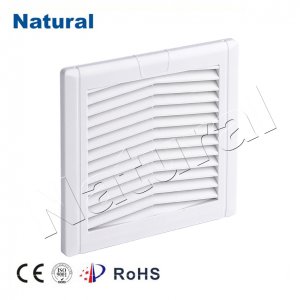In today’s industrial and technological landscape, maintaining optimal air quality and equipment efficiency is of paramount importance. One often-overlooked but essential component in achieving these goals is the filter fan. Filter fans play a crucial role in various applications, from industrial settings to data centers, by ensuring a constant flow of clean air. In this article, we will delve into the world of filter fans, exploring their significance, functionality, and the benefits they offer.

What is a Filter Fan? A filter fan, also known as a ventilation fan or exhaust fan, is a mechanical device designed to regulate and improve air circulation within enclosed spaces. It consists of a fan unit combined with a filtration system, which typically includes filters of varying efficiency levels. The primary purpose of a filter fan is to expel impure air, contaminants, and excess heat from an enclosure while simultaneously introducing clean, fresh air. Importance of Filter Fans Air Quality Improvement:Filter fans are instrumental in maintaining clean and breathable air within indoor environments. In industrial settings, they help remove dust, fumes, and other airborne particles that can be harmful to both human health and equipment. Temperature Control:Filter fans play a crucial role in controlling the temperature within enclosures. By expelling hot air and introducing cooler air, they help prevent overheating of electronic components, which is especially critical in data centers and control cabinets. Equipment Protection:Dust and particulate matter can wreak havoc on sensitive electronic equipment. Filter fans act as a first line of defense by preventing contaminants from entering enclosures, thus prolonging the lifespan and reliability of machinery. Energy Efficiency:Filter fans are energy-efficient solutions. By removing excess heat and maintaining a stable temperature, they reduce the workload on cooling systems, resulting in lower energy consumption and cost savings. How Filter Fans Work Filter fans work on a simple yet effective principle. The fan unit is strategically positioned on the enclosure, and the filtration system consists of one or more filters placed on the intake side. When the fan is activated, it draws air from the surrounding environment through the filters and into the enclosure. As the air circulates within the enclosure, it absorbs heat and contaminants before being expelled through the exhaust side of the fan. This continuous cycle ensures a constant supply of clean, cool air while expelling impurities and excess heat. Types of Filter Fans There are several types of filter fans available, each designed to meet specific requirements: Standard Filter Fans:These are the most common type of filter fans and are suitable for general-purpose ventilation. High-Efficiency Filter Fans:Ideal for environments with stringent air quality requirements, such as cleanrooms or laboratories. Compact Filter Fans:Designed for smaller enclosures or tight spaces where a standard-sized fan may not fit. Thermostat-Controlled Filter Fans:Equipped with thermostats, these fans activate only when the temperature exceeds a set threshold, increasing energy efficiency. Benefits of Using Filter Fans Cost Savings:Filter fans are a cost-effective solution for maintaining air quality and equipment temperature. Equipment Reliability:By preventing overheating and dust accumulation, filter fans contribute to the longevity and reliability of machinery. Compliance:In industries with strict regulations on air quality, filter fans help ensure compliance with environmental and safety standards. Quiet Operation:Many modern filter fans operate quietly, making them suitable for use in noise-sensitive environments. Conclusion In the pursuit of clean air, equipment reliability, and energy efficiency, filter fans stand as silent heroes. Their ability to maintain optimal air quality and equipment temperature makes them an indispensable component in various industries. From factories to data centers, these unassuming devices play a significant role in safeguarding both human health and the longevity of valuable equipment. As technology continues to advance, filter fans will undoubtedly remain an essential tool in our quest for a healthier and more efficient future.